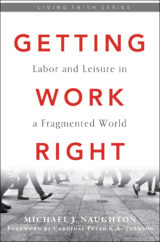By Michael Naughton
Dr. Michael Naughton is the director of the Center for Catholic Studies at the University of St. Thomas (Minnesota). He holds the Koch Chair in Catholic Studies and is a full professor in the department of Catholic Studies. Dr. Naughton also serves as board chair for Reell Precision Manufacturing. He helped coordinate and write the Vocation of the Business Leader issued by the Dicastery for Promoting Integral Human Development, which has been translated in over fifteen languages. He is the author, co-author, and co-editor of ten books and over fifty articles, including Getting Work Right: Labor and Leisure in a Fragmented World.

When I sixteen years of age I was walking out of the house one Saturday evening, my father—who is from Ireland—said to me in his Irish brogue, “Michael, you be a good boy now.” “Sure dad,” I replied, quickly adding that word favored by teenagers everywhere, “whatever.” So he then went on to add a back-up plan: “But if you can’t be good, be careful.” With some hesitation, I thought, “I can do that.”
An unfortunate event happened to me that evening, however. I will spare you the details, but my dad eventually had to pick me up from a Chicago police station. He walked into the station, and, as he looked at me, wryly revised his advice: “Michael, I think you better just be good!”
We live in a culture that has tended to lose sight of being good, fixating instead on being careful. We have “designated drivers,” safe and careful people who take home their drunk and stupid friends. And we have career strategies that calculate the effects of our actions in climbing the proverbial ladder of success but lose sight of good and meaningful work.
In business we are lured in by this temptation to be only careful—what some have called a utilitarian mindset by which everything is calculated on the basis of its immediate usefulness. Because business is rightly concerned about being practical and useful, this utility-driven mentality can subdue us into a false unity of life that over a lifetime creates a shallow and superficial existence.
If we are to live as if our faith mattered, if we are to be good beyond the fleeting slogans of our culture of mere usefulness, we need to ask ourselves some big questions—big enough to open our minds to see what is at stake and our hearts to embrace what should be loved. Here are three of these questions:
What am I working for? To what am I giving myself in the work I do? Our work is too important to us to deprive ourselves of a serious answer. Yet a good answer will not come from within our work alone, since the dynamics of work do not provide enough depth to get to the heart of the matter. We need to ask a second question.
What am I resting in? What am I receiving? The answer to our work will be found in our rest, our leisure—in what we receive. As the Book of Genesis tells us, we are made not only to work but also to rest.
What am I living for? If we can put the prior two questions together such that they inform each other, we can get to the heart of the real meaning of our lives. The point is not simply to find a balance between work and rest as I mentioned in my last post, but rather to participate in their proper integration.
In answering these questions, we are tempted by a “two-ditch” problem. Every road has not one ditch but two—one on either side. As regards to work, the two ditches that we can fall into come from either undervaluing or overvaluing our work and its place in our lives.
On one side of us is the “job ditch” of undervaluing ourselves in our work. Falling into this ditch, we expect too little out of our work and we fail to recognize how important it is for our human formation. The attitude of the job is best captured by a sign in a workplace that reads: “There’s no fulfillment here.” If you are looking for fulfillment, go somewhere else. You won’t find it in the workplace. Its only about the paycheck.
The problem with this attitude is that it is a lie. It conceals an important fact about work that Pope John Paul II called the subjective dimension of work. When we work we not only affect and change objects outside of ourselves, but more profoundly, we change our very selves.
On the other side of the road is the “career ditch,” in which we overinvest ourselves in work and expect more from it than it can give. When we fall into this ditch, we expect our career to completely define us, to provide us with a meaningful identity. The result is an inner void and a confused sense of identity. Philosopher Josef Pieper has described the identity problem of the careerist as acedia, a restlessness of spirit that results in “despairing refusal to be oneself.” Careerists see themselves as only workers whether entrepreneurs, professors, doctors, executives. Too often, the careerist becomes a workaholic, precisely to avoid the rest necessary to be oneself.
In contrast to the individualism inherent in the notion of a “job” or a “career,” we long to discover the truth that our work is not only about our discrete and arbitrary choices, but instead depends on a choice to participate in a received, created order expressed in terms of the logic of gift. Because gift is at the heart of this stance, it is a call that is not achieved but received, not accomplished but accepted.
You Might Also Like

The divided life is a temptation so built into our society, we may not even recognize it. Yet most of us fall prey to it. We either undervalue work, resenting it as simply a job, or we overvalue it as an identity-defining career. Michael Naughton, drawing on his background in both business and theology, proposes that the key to finding balance is another important human activity: leisure. In light of leisure—not mere amusement, but time for family, silence, prayer, and above all, worship—work becomes a space where men and women can find deep fulfillment. Naughton provides real-world examples of how businesses can promote authentic human flourishing and innovation through practices and policies that support leisure.
In Getting Work Right Michael Naughton will change how you work—and rest.

